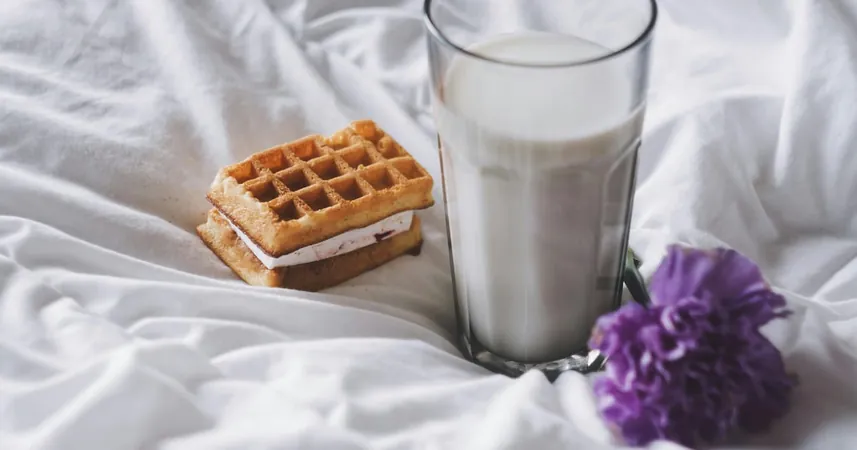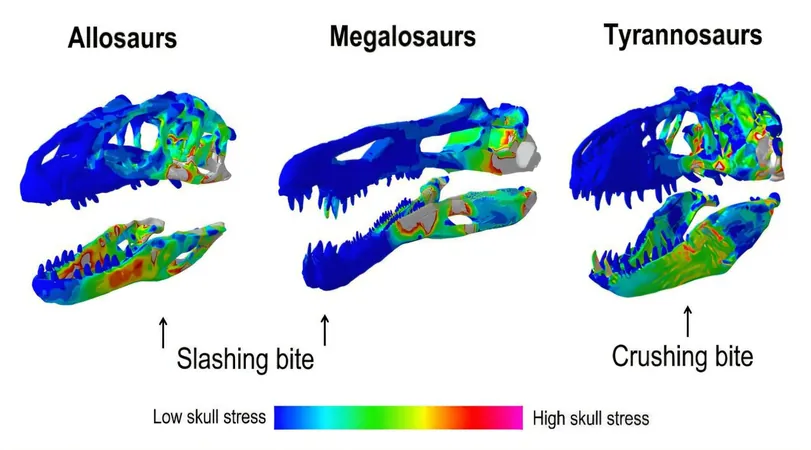
Are Nightmares Haunting You? Dairy and Sweets Could Be to Blame!
2025-07-01
Author: Benjamin
Nightmares Linked to Dairy? A Shocking Study Reveals!
A groundbreaking study from Canada has thrown a startling light on the foods we eat and the dreams we experience, suggesting that dairy products may be linked to an increase in nightmares and disrupted sleep.
Published in *Frontiers in Psychology*, the research surveyed over 1,000 students at MacEwan University in Edmonton, probing the connections between diet, gastrointestinal distress, and sleep quality.
Surprisingly, around one-third of participants reported frequent nightmares. Those with food sensitivities, particularly lactose intolerance, were found to report much worse sleep disturbances and more intense negative dreams.
A Closer Look at Food Sensitivities and Nightmares
Dr. Tore Nielsen, the study's lead author and director of the Dream and Nightmare Laboratory at Université de Montréal, commented, "The severity of lactose intolerance symptoms was linked to the intensity of nightmare disorders. The worse the symptoms, the more severe the nightmares."
Participants filled out detailed questionnaires about their food habits, sleep patterns, emotional quality of dreams, and overall health, leading researchers to categorize diets as either healthy or unhealthy.
Unhealthy Eating: The Nightmare Generator?
Interestingly, those characterized as unhealthy eaters—who often indulge in fast food, skip meals, or eat late at night—cited even more negative dreams.
"Unhealthy eating was indeed associated with increased nightmares and negative dreams overall," Dr. Nielsen affirmed.
Desserts: The Dream Demons?
Although only a few participants believed food directly impacted their dreams, many pointed fingers at dairy, spicy foods, or sweet treats as the culprits. Desserts were the most frequently mentioned offenders.
Dr. Nielsen noted, "Desserts often contain dairy, so it's likely that cheese and ice cream are part of that blame game."
What About Food Allergies?
Self-reported lactose intolerance emerged as the strongest dietary factor associated with nightmares, with food allergies following closely behind. However, the data on food allergies was limited due to a smaller sample size.
Late-Night Snacking: Is Your Fridge the Real Villain?
The study also looked into late-night eating habits. Dr. Nielsen remarked, "We were intrigued by a phenomenon called night eating, where individuals unknowingly snack out of their fridge and return to bed." While not common, this behavior contributes to the unhealthy eating classification.
Can Food Really Impact Our Dreams?
So, can the food we eat before bed truly alter our dreams? Dr. Nielsen indicated that while certain foods can disrupt sleep, the link to dreaming is less clear cut.
He cautioned that self-reported data has its limitations, noting that to definitively understand the relationship between food and dreams, controlled experiments are necessary.
“We need to conduct experimental studies where different groups consume various foods before sleep and then compare their dream experiences,” he suggested.
In Summary: What You Eat Might Affect Your Sleep!
With this eye-opening study, those who frequently find themselves in a nightmare spiraling scenario might want to take a closer look at their late-night snacking habits, particularly regarding dairy and sweets!









 Brasil (PT)
Brasil (PT)
 Canada (EN)
Canada (EN)
 Chile (ES)
Chile (ES)
 Česko (CS)
Česko (CS)
 대한민국 (KO)
대한민국 (KO)
 España (ES)
España (ES)
 France (FR)
France (FR)
 Hong Kong (EN)
Hong Kong (EN)
 Italia (IT)
Italia (IT)
 日本 (JA)
日本 (JA)
 Magyarország (HU)
Magyarország (HU)
 Norge (NO)
Norge (NO)
 Polska (PL)
Polska (PL)
 Schweiz (DE)
Schweiz (DE)
 Singapore (EN)
Singapore (EN)
 Sverige (SV)
Sverige (SV)
 Suomi (FI)
Suomi (FI)
 Türkiye (TR)
Türkiye (TR)
 الإمارات العربية المتحدة (AR)
الإمارات العربية المتحدة (AR)